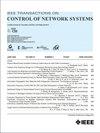失去对线性网络的控制?试试弹性理论
IF 4
3区 计算机科学
Q2 AUTOMATION & CONTROL SYSTEMS
引用次数: 0
摘要
本文章由计算机程序翻译,如有差异,请以英文原文为准。
Losing Control of Your Linear Network? Try Resilience Theory
Resilience of cyber-physical networks to unexpected failures is a critical need widely recognized across domains. For instance, power grids, telecommunication networks, transportation infrastructures, and water treatment systems have all been subject to disruptive malfunctions and catastrophic cyberattacks. Following such adverse events, we investigate scenarios where a node of a linear network suffers a loss of control authority over some of its actuators. These actuators are not following the controller's commands and are instead producing undesirable outputs. The repercussions of such a loss of control can propagate and destabilize the whole network despite the malfunction occurring at a single node. To assess system vulnerability, we establish resilience conditions for networks with a subsystem enduring a loss of control authority over some of its actuators. Furthermore, we quantify the destabilizing impact on the overall network when such a malfunction perturbs a nonresilient subsystem. We illustrate our resilience conditions on two academic examples, on an islanded microgrid and on the linearized IEEE 39-bus system.
求助全文
通过发布文献求助,成功后即可免费获取论文全文。
去求助
来源期刊

IEEE Transactions on Control of Network Systems
Mathematics-Control and Optimization
CiteScore
7.80
自引率
7.10%
发文量
169
期刊介绍:
The IEEE Transactions on Control of Network Systems is committed to the timely publication of high-impact papers at the intersection of control systems and network science. In particular, the journal addresses research on the analysis, design and implementation of networked control systems, as well as control over networks. Relevant work includes the full spectrum from basic research on control systems to the design of engineering solutions for automatic control of, and over, networks. The topics covered by this journal include: Coordinated control and estimation over networks, Control and computation over sensor networks, Control under communication constraints, Control and performance analysis issues that arise in the dynamics of networks used in application areas such as communications, computers, transportation, manufacturing, Web ranking and aggregation, social networks, biology, power systems, economics, Synchronization of activities across a controlled network, Stability analysis of controlled networks, Analysis of networks as hybrid dynamical systems.
 求助内容:
求助内容: 应助结果提醒方式:
应助结果提醒方式:


